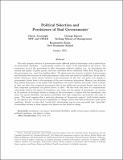| dc.contributor.author | Acemoglu, Daron | |
| dc.contributor.author | Egorov, Georgy | |
| dc.contributor.author | Sonin, Konstantin | |
| dc.date.accessioned | 2011-03-18T20:53:47Z | |
| dc.date.available | 2011-03-18T20:53:47Z | |
| dc.date.issued | 2010-01 | |
| dc.identifier.issn | 0033-5533 | |
| dc.identifier.issn | 1531-4650 | |
| dc.identifier.uri | http://hdl.handle.net/1721.1/61743 | |
| dc.description.abstract | We study dynamic selection of governments under different political institutions, with a special focus
on institutional flexibility . A government consists of a subset of the individuals in the society. The
competence level of the government in office determines collective utilities (e.g., by determining the
amount and quality of public goods), and each individual derives additional utility from being part of
the government (e.g., rents from holding office). We characterize the dynamic evolution of governments
and determine the structure of stable governments, which arise and persist in equilibrium. In our model,
perfect democracy, where current members of the government do not have veto power over changes in
governments, always leads to the emergence of the most competent government. However, any deviation
from perfect democracy, to any regime with incumbency veto power, destroys this result. There is always
at least one other, less competent government that is also stable and can persist forever, and even the
least competent government can persist forever in office. We also show that there is a nonmonotonic
relationship between the degree of incumbency veto power and the quality of government. In contrast,
in the presence of stochastic shocks or changes in the environment, a regime with less incumbency veto
power has greater fl exibility and greater probability that high competence governments will come to
power. This result suggests that a particular advantage of democratic regimes (with limited number
of veto players) may be their greater adaptability to changes rather than their performance under given
conditions. Finally, we show that royalty-like dictatorships may be more successful than junta-like
dictatorships because in these regimes veto players are less afraid of change. | en_US |
| dc.description.sponsorship | National Science Foundation (U.S.) | en_US |
| dc.description.sponsorship | Canadian Institute for Advanced Research | en_US |
| dc.language.iso | en_US | |
| dc.publisher | Harvard University | en_US |
| dc.relation.isversionof | http://dx.doi.org/10.1162/qjec.2010.125.4.1511 | |
| dc.rights | Attribution-Noncommercial-Share Alike 3.0 Unported | en_US |
| dc.rights.uri | http://creativecommons.org/licenses/by-nc/3.0/ | en_US |
| dc.source | MIT web domain | en_US |
| dc.title | Political Selection and Persistence of Bad Governments | en_US |
| dc.type | Article | en_US |
| dc.identifier.citation | Acemoglu, Daron, Georgy Egorov and Konstantin Sonin. "Political Selection and Persistence of Bad Governments" The Quarterly Journal of Economics (2010) 125 (4): 1511-1575. | en_US |
| dc.contributor.department | Massachusetts Institute of Technology. Department of Economics | en_US |
| dc.contributor.approver | Acemoglu, Daron | |
| dc.contributor.mitauthor | Acemoglu, Daron | |
| dc.relation.journal | Quarterly Journal of Economics | en_US |
| dc.eprint.version | Author's final manuscript | en_US |
| dc.type.uri | http://purl.org/eprint/type/JournalArticle | en_US |
| eprint.status | http://purl.org/eprint/status/PeerReviewed | en_US |
| dspace.orderedauthors | Acemoglu, Daron; Egorov, Georgy; Sonin, Konstantin | |
| dc.identifier.orcid | https://orcid.org/0000-0003-0908-7491 | |
| mit.license | OPEN_ACCESS_POLICY | en_US |
| mit.metadata.status | Complete | |
